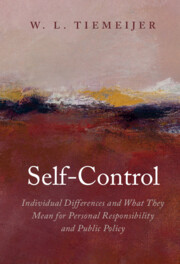 Self-Control
Self-Control from Part I - Self-Control
Published online by Cambridge University Press: 20 August 2022
This is the first chapter of Part I, which covers the relevant psychology. I summarize research showing that self-control is “a significant predictor of school and work achievement, income and socioeconomic status, financial planning and struggle, physical health, eating and weight-related behavior, substance abuse, decision-making, relationships and interpersonal skills, ability to deal with anger, frustration, and stress, and – last but not least –criminal offenses.” The correlation between these outcomes and the capacity for self-control is considerable, sometimes even outstripping the correlation with intelligence. The chapter also shows that having good self-control is not just a matter of volition, but has all the characteristics of a personality trait. Some people are better at self-control than others, with the basic capacity for self-control largely determined by genes and early upbringing.
To save this book to your Kindle, first ensure no-reply@cambridge.org is added to your Approved Personal Document E-mail List under your Personal Document Settings on the Manage Your Content and Devices page of your Amazon account. Then enter the ‘name’ part of your Kindle email address below. Find out more about saving to your Kindle.
Note you can select to save to either the @free.kindle.com or @kindle.com variations. ‘@free.kindle.com’ emails are free but can only be saved to your device when it is connected to wi-fi. ‘@kindle.com’ emails can be delivered even when you are not connected to wi-fi, but note that service fees apply.
Find out more about the Kindle Personal Document Service.
To save content items to your account, please confirm that you agree to abide by our usage policies. If this is the first time you use this feature, you will be asked to authorise Cambridge Core to connect with your account. Find out more about saving content to Dropbox.
To save content items to your account, please confirm that you agree to abide by our usage policies. If this is the first time you use this feature, you will be asked to authorise Cambridge Core to connect with your account. Find out more about saving content to Google Drive.